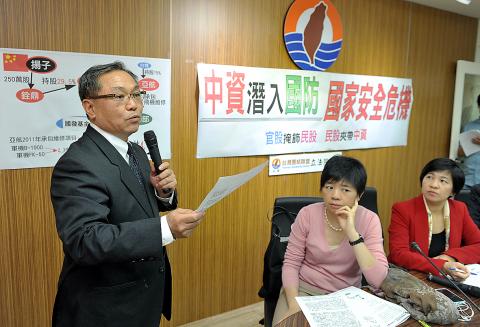A firm in which Chinese capital is invested is in charge of conducting maintenance work on Taiwanese military aircraft, Taiwan Solidarity Union (TSU) lawmakers said yesterday, warning that as a result, sensitive national defense information could be obtained by Beijing.
The AirAsia group won maintenance bids worth NT$230 million (US$7.85 million) for the air force’s fleet of B-1900 and FK-50 aircraft as well as the army’s CH47, OH-58 and TH67 helicopters last year, TSU Legislator Lin Shih-chia (林世嘉) told a press conference.
Hong Kong-based Yangtse Development Co, owned by arms broker Yang Dong (楊棟), has purchased 2.5 million shares in Taiwan-listed Chuan Ting Co, which in turn invested in Taiwan Aerospace Corp (TAC), TSU Legislator Huang Wen-ling (黃文玲) said, adding that TAC controls 82 percent of the shares of AirAsia.

Photo: Chien Jung-fong, Taipei Times
“Chuan Ting therefore owns 25 percent of the shares in AirAsia,” TSU Legislator Hsu Chung-hsin (許忠信) said.
Yangtse could possibly able to take control of AirAsia via a series of reinvestments, Hsu said, adding that the Ministry of National Defense (MND) should revoke the company’s bidding rights and the Ministry of Economic Affairs’ (MOEA) Investment Commission should launch an investigation into the matter.
Information related to crucial technology and maintenance manuals for fighter jets could be leaked to the Chinese and that is why the US has been reluctant to sell advanced weapons to Taiwan, Hsu said.
Hsiao Tien-liu (蕭天流), an official at the MND’s Armaments Bureau, said maintenance of core elements related to navigation, fire-control radars and electronic warfare was maintained exclusively by the military.
There has been no evidence that proves AirAsia had a military background or made investments with a military purpose, Hsiao said, adding that the company would be barred from bidding according to the Government Procurement Act (政府採購法) if wrongful motivation is confirmed.
Investment Commission Executive Director Chang Ming-ping (張銘彬) said the commission would launch an investigation within one month and submit its complete reports to the legislature.

Taiwanese can file complaints with the Tourism Administration to report travel agencies if their activities caused termination of a person’s citizenship, Mainland Affairs Council Minister Chiu Chui-cheng (邱垂正) said yesterday, after a podcaster highlighted a case in which a person’s citizenship was canceled for receiving a single-use Chinese passport to enter Russia. The council is aware of incidents in which people who signed up through Chinese travel agencies for tours of Russia were told they could obtain Russian visas and fast-track border clearance, Chiu told reporters on the sidelines of an event in Taipei. However, the travel agencies actually applied

Japanese footwear brand Onitsuka Tiger today issued a public apology and said it has suspended an employee amid allegations that the staff member discriminated against a Vietnamese customer at its Taipei 101 store. Posting on the social media platform Threads yesterday, a user said that an employee at the store said that “those shoes are very expensive” when her friend, who is a migrant worker from Vietnam, asked for assistance. The employee then ignored her until she asked again, to which she replied: "We don't have a size 37." The post had amassed nearly 26,000 likes and 916 comments as of this

New measures aimed at making Taiwan more attractive to foreign professionals came into effect this month, the National Development Council said yesterday. Among the changes, international students at Taiwanese universities would be able to work in Taiwan without a work permit in the two years after they graduate, explainer materials provided by the council said. In addition, foreign nationals who graduated from one of the world’s top 200 universities within the past five years can also apply for a two-year open work permit. Previously, those graduates would have needed to apply for a work permit using point-based criteria or have a Taiwanese company

The Shilin District Prosecutors’ Office yesterday indicted two Taiwanese and issued a wanted notice for Pete Liu (劉作虎), founder of Shenzhen-based smartphone manufacturer OnePlus Technology Co (萬普拉斯科技), for allegedly contravening the Act Governing Relations Between the People of the Taiwan Area and the Mainland Area (臺灣地區與大陸地區人民關係條例) by poaching 70 engineers in Taiwan. Liu allegedly traveled to Taiwan at the end of 2014 and met with a Taiwanese man surnamed Lin (林) to discuss establishing a mobile software research and development (R&D) team in Taiwan, prosecutors said. Without approval from the government, Lin, following Liu’s instructions, recruited more than 70 software